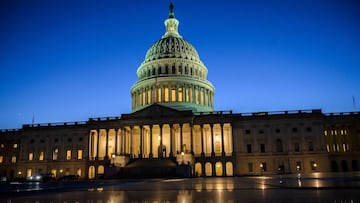Senate approves temporary debt increase of $480 billion: how will this affect Americans?
After weeks of negotiations, a temporary rise to the US debt ceiling was approved in the Senate to ensure that the country does not default for a first time.


On Thursday evening the Senate voted in favour of legislation that will temporarily raise the United States’ $28.4 trillion debt ceiling and prevent a national default later this month.
The package was approved thanks to a 61-38 bipartisan decision to waive the filibuster, followed by a 50-48 party line vote from the Democrats. If the bill passes the House of Representatives, the debt ceiling will be temporarily raised by $480 billion until 3 December.
The nation had been expected to surpass its debt ceiling on 18 October, which would have had unimaginable consequences for the US as it continues its covid-19 economic recovery. The passage of a temporary debt ceiling increase can only be a good thing for the economy, but how will it affect working Americans?
Bill passage prevents recession risk
Earlier this week, Treasury Secretary Janet Yellen warned that the US economy could slip into recession if the nation was allowed to default on its commitments.
She told an interview with CNBC: “It would be catastrophic to not pay the government’s bills, for us to be in a position where we lacked the resources to pay the government’s bills,” adding, “I fully expect it would cause a recession as well.”
50-48, Senate passes debt ceiling increase. House action likely next week. Staves off default until December, when it will only get harder
— Manu Raju (@mkraju) October 8, 2021
It was the Treasury Department who flagged the 18 October deadline as the point at which the US would be unable to cover its debts. The Treasury was already using emergency measures to ensure that the country was able to avoid a default, something that would have a hugely damaging impact on the economic recovery post-covid.
Federal programmes would have been affected
Hitting the debt ceiling could have crippled the spending of the federal government and myriad programmes and essential services could have been disrupted. The New York Times reports that the 65 million Americans who currently receive Social Security benefits could have seen their payments delayed.
The federally-funded Medicare and Medicaid would also suffer delays in funding, which could prevent some patients from getting the treatment that they require if allowed to continue for weeks.
The expanded Child Tax Credit would likely have also suffered from a debt default, leaving around 35 million families without the payments until the issue was resolved.
Hoyer announces the House will return from recess on Tuesday, October 12the to vote on the Senate-passed bill suspending the debt ceiling though December 3rd by $480B. pic.twitter.com/cRhk5bR0BP
— Craig Caplan (@CraigCaplan) October 8, 2021
Temporary nature of debt ceiling brings another distraction
The avoidance of an unprecedented debt default is undoubtedly a positive outcome for the American people, but the ongoing issue will almost certain affect the running of government in the coming eight weeks.
Related stories
The legislation only provides a temporary extension, meaning that a fiercely partisan Congress will have an additional priority to fit alongside President Biden’s ambitious Build Back Better agenda and the passage of the 12 federal spending bills required to keep the government running.
Biden and Democratic leaders in Congress will have their work cut out to keep the party together through a very precarious period, and there is the chance that some elements of Biden’s legislative agenda may get side-lined to ensure that a more long-term solution to the debt ceiling crisis can be agreed.

